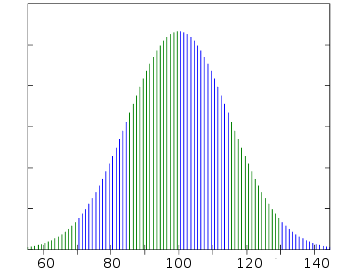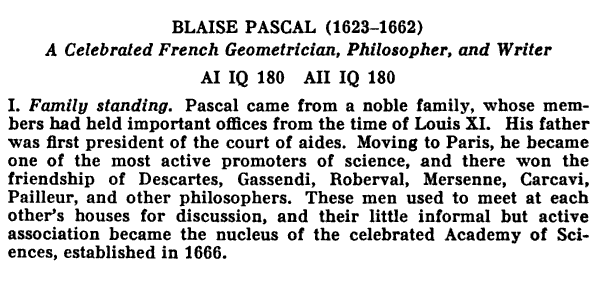Extreme Intelligence
October 14, 2011
I wrote about the
BBC television documentary series,
The Ascent of Man, and its companion book, in a
previous article (The Western Intellectual Tradition, April 15, 2011).
Jacob Bronowski (January 18, 1908 - August 22, 1974), the author of that series, was a
British mathematician who spent much of his time writing about
science and its history.
The first episode of that thirteen part documentary starts this way.
"Man is a singular creature. He has a set of gifts that make him unique among the animals: so that, unlike them, he is not a figure in the landscape - he is a shaper of the landscape."
Intelligence is one trait that distinguishes humans from other
species, but it's apparent to all that the degree of intelligence among people is not uniform. When something is variable,
scientists want to affix a number to it, so that the variability can be understood.
Lewis Terman, father of the notable
electrical engineer,
Frederick Terman, was a
psychologist who invented the
Stanford-Binet IQ test to assign a number to intelligence. I wrote about the Termans in
another article (Frederick Terman, July 12, 2011).
The number assigned to intelligence is IQ, or
Intelligence Quotient. The quotient label comes from the original definition of intelligence as the ratio of "mental age" to "physical age," the idea being that people learn throughout their lives, and a ten year old who knows as much as a twelve year old is obviously intelligent. This definition has problems, since an IQ of 200 at my age means that my mind is as sharp as that of a 125 year old man. The IQ number is now used
statistically, and it no longer follows the quotient rule (see figure).[3]

Idealized Distribution of IQ Scores.
The mean is 100, and the standard deviation is 15.
It can be seen from the curve that IQ scores above 140 are very rare.
(Graph by Alessio Damato, via Wikimedia Commons))
One prominent aspect of the study of intelligence is the
nature vs. nurture debate. The debate is about whether
general intelligence is
mostly genetic. Recent research has shown that the
heritability of IQ is about 0.75, which is quite significant, but this heritability seems to express itself only in adulthood.
In 1926,
Catharine Cox Miles published a
historiometric study that examined the estimated IQ of prominent historical figures, some scientists included.[4] Some of these are tabulated on various Internet sites, and I include a selection in the table, below. Also shown below is an excerpt from her book that prefaces the study that determined that
Pascal had an IQ of about 180. I've included three documented IQ values for three twentieth century scientists.[7]

Excerpt from the Blaise Pascal chapter in Catherine Morris Cox, 'The Early Mental Traits Of Three Hundred Geniuses,' Stanford University Press, 1926, page 690. (Via Google Books).[4]
So, a lot of great scientists had an extremely high IQ, but other respectable characters (e.g., Richard Feynman) had an IQ that was high, but not stratospheric. This brings us to the question as to whether IQ above a certain point matters. One idea is that middling high IQ is good, but extreme IQ comes with some
emotional baggage that counteracts its beneficial affects.
I'm reminded of the little-known
Sean Connery movie, "
A Fine Madness" (1966,
Irvin Kershner, Director), in which Connery plays a character named Samson Shillitoe.[8] Shillitoe is a genius poet who suffers from writer's block, and he has anger problems that interfere with his success.
David Brooks writes in his recent book, "The Social Animal,"[9]
"A person with a 150 IQ is in theory much smarter than a person with a 120 IQ, but those additional 30 points produce little measurable benefit when it comes to lifetime success."
To examine this idea that success does not scale with IQ,
David Hambrick of Michigan State University and
Elizabeth Meinz of Southern Illinois University did a study published in the journal,
Current Directions in Psychological Science.[10] Their conclusion: "A high level of intellectual ability puts a person at a measurable advantage – and the higher the better."[11]
Their paper presents evidence that
working memory, which is closely related to general intelligence of the type measured by IQ tests, may distinguish between the "good," and the "great." A series of studies by the authors showed that people who were tested to have greater working memory outperformed others at tasks such as
piano sight reading. They excelled even when compared against people with extensive experience and knowledge of the task.
Says Hambrick,
"While the specialized knowledge that accumulates through practice is the most important ingredient to reach a very high level of skill, it's not always sufficient... Working memory capacity can still predict performance in complex domains such as music, chess, science, and maybe even in sports that have a substantial mental component such as golf."[11]
One piece of
anecdotal evidence known to all seems to support this theory; that is, the general failure of our educational system, no matter how much money we pump into it. Says Hambrick, "for a very long time we have tried and failed to come up with ways to boost people's intelligence."[11] See Ref. 12 for an article about the problem of educating a child with extreme intelligence.[12]
References:
- Jacob Bronowski, "The Ascent of Man," Little Brown & Co., April 1974, 448 pages (via Amazon).
- Jacob Bronowski, "Ascent of Man - Episode 1, Lower than the Angels - Part 01," BBC Television (via YouTube).
- For an anecdote about my own experience with intelligence testing, see This Blog, Lévy Flight, November 15, 2007.
- Catherine Morris Cox, "The Early Mental Traits Of Three Hundred Geniuses," Stanford University Press, 1926, 842 pages (via Google Books).
- Estimated IQs of some of the Greatest Geniuses.
- Nicole Williams, "IQ Scores of Famous People Past and Present".
- Physics Forums Message Thread No. 178932.
- A Fine Madness (1966), Irvin Kershner, Director, on the Internet Movie Database
- David Brooks, "The Social Animal: The Hidden Sources of Love, Character, and Achievement," Random House,March 8, 2011, 448 pages (via Amazon).
- David Z. Hambrick and Elizabeth J. Meinz, "Limits on the Predictive Power of Domain-Specific Experience and Knowledge in Skilled Performance," Current Directions in Psychological Science, vol. 20, no. 5 (October 2011), pp. 275-279. PDF file is available, here.
- Andy Henion, "MSU research sheds light on origins of greatness," Michigan State University Press Release, October 5, 2011.
- Katherine Long, "Educating Gabriel, 13, an off-the-charts prodigy," The Seattle Times, October 8, 2011.
Permanent Link to this article
Linked Keywords: BBC television; documentary series; The Ascent of Man; Jacob Bronowski; British; mathematician; science; Intelligence; species; scientists; Lewis Terman; electrical engineer; Frederick Terman; psychologist; Stanford-Binet IQ test; Intelligence Quotient; statistics; mean; standard deviation; Alessio Damato; Wikimedia Commons; nature vs. nurture; general intelligence; heritability of IQ; Catharine Cox Miles; historiometric study; Pascal; Leonardo da Vinci; Gottfried Wilhelm von Leibniz; Francis Galton; Blaise Pascal; Isaac Newton; Pierre Simon de Laplace; Galileo Galilei; Joseph Louis Lagrange; René Descartes; Johannes Kepler; Sofia Kovalevskaya; Linus Pauling; Charles Darwin; Nicolaus Copernicus; Albert Einstein; Stephen Hawking; William Shockley; Richard Feynman; James Watson; Google Books; emotional baggage; Sean Connery; A Fine Madness; Irvin Kershner; David Hambrick; Elizabeth Meinz; Current Directions in Psychological Science; working memory; piano sight reading; music; chess; science; sports; golf; anecdotal evidence.